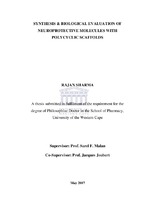| dc.contributor.advisor | Malan, Sarel F. | |
| dc.contributor.advisor | Joubert, Jacques | |
| dc.contributor.author | Sharma, Rajan | |
| dc.date.accessioned | 2018-08-07T13:50:16Z | |
| dc.date.available | 2018-08-07T13:50:16Z | |
| dc.date.issued | 2017 | |
| dc.identifier.uri | http://hdl.handle.net/11394/6228 | |
| dc.description | Doctor Pharmaceuticae - Dpharm | |
| dc.description.abstract | Among neurological disorders, many of the most devastating disorders are
neurodegenerative. Modern research associates excitotoxicity to a variety of
neuropathological conditions, suggesting that the neurodegenerative diseases with
distinct etiologies may have excitotoxicity as a common pathway. Excitotoxicity
occurs through over-stimulation of receptors for excitatory neurotransmitters like
the N-methyl-D-aspartate (NMDA) receptors. Due to the relevance of NMDA
receptors and excitotoxic processes, the antagonism or modulation of NMDA
receptors is used as a therapeutic tool against neurodegenerative diseases. NMDA
receptor activity can be modulated by S-nitrosylation and this modulation of
NMDA receptor activity can be utilised in the development of neuroprotective
drugs. | |
| dc.language.iso | en | |
| dc.publisher | University of the Western Cape | |
| dc.subject | Neurodegenerative diseases | |
| dc.subject | Excitotoxicity | |
| dc.subject | Apoptosis | |
| dc.subject | Polycyclic cage compounds | |
| dc.subject | Drug design | |
| dc.subject | Neuroprotection | |
| dc.subject | N-methyl-D-aspartate (NMDA) receptors | |
| dc.subject | Calcium influx | |
| dc.subject | Nitric oxide | |
| dc.subject | NO-donating | |
| dc.subject | S-nitrosylation | |
| dc.title | Synthesis & biological evaluation of neuroprotective molecules with polycyclic scaffolds | |
| dc.rights.holder | University of the Western Cape | |

